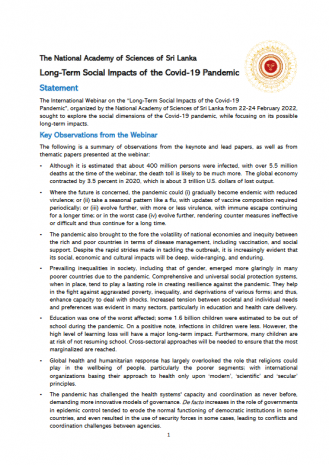Statement
The International Webinar on the “Long-Term Social Impacts of the Covid-19 Pandemic”, organized by the National Academy of Sciences of Sri Lanka from 22-24 February 2022, sought to explore the social dimensions of the Covid-19 pandemic, while focusing on its possible long-term impacts.
Key Observations from the Webinar
The following is a summary of observations from the keynote and lead papers, as well as from thematic papers presented at the webinar:
- Although it is estimated that about 400 million persons were infected, with over 5.5 million deaths at the time of the webinar, the death toll is likely to be much more. The global economy contracted by 3.5 percent in 2020, which is about 3 trillion U.S. dollars of lost output.
- Where the future is concerned, the pandemic could (i) gradually become endemic with reduced virulence; or (ii) take a seasonal pattern like a flu, with updates of vaccine composition required periodically; or (iii) evolve further, with more or less virulence, with immune escape continuing for a longer time; or in the worst case (iv) evolve further, rendering counter measures ineffective or difficult and thus continue for a long time.
- The pandemic also brought to the fore the volatility of national economies and inequity between the rich and poor countries in terms of disease management, including vaccination, and social support. Despite the rapid strides made in tackling the outbreak, it is increasingly evident that its social, economic and cultural impacts will be deep, wide-ranging, and enduring.
- Prevailing inequalities in society, including that of gender, emerged more glaringly in many poorer countries due to the pandemic. Comprehensive and universal social protection systems, when in place, tend to play a lasting role in creating resilience against the pandemic. They help in the fight against aggravated poverty, inequality, and deprivations of various forms; and thus, enhance capacity to deal with shocks. Increased tension between societal and individual needs and preferences was evident in many sectors, particularly in education and health care delivery.
- Education was one of the worst affected; some 1.6 billion children were estimated to be out of school during the pandemic. On a positive note, infections in children were less. However, the high level of learning loss will have a major long-term impact. Furthermore, many children are at risk of not resuming school. Cross-sectoral approaches will be needed to ensure that the most marginalized are reached.
- Global health and humanitarian response has largely overlooked the role that religions could play in the wellbeing of people, particularly the poorer segments; with international organizations basing their approach to health only upon ‘modern’, ‘scientific’ and ‘secular’ principles.
- The pandemic has challenged the health systems' capacity and coordination as never before, demanding more innovative models of governance. De facto increases in the role of governments in epidemic control tended to erode the normal functioning of democratic institutions in some countries, and even resulted in the use of security forces in some cases, leading to conflicts and coordination challenges between agencies.
- The crucial importance of the public’s trust in governing authorities, for managing both the epidemic and the ‘infodemic’ was highlighted. The potential of local communities both to foster such trust and to mobilize social services was also brought out.
- The need for and potential of the greater use of foresight analysis was also demonstrated, through the example of an exercise carried out in relation to the pandemic.
- The pandemic had demonstrated why science-informed political leadership is critically important in times of disaster and despair, including management of misinformation, need for real-time data for decision-making, and developing more adaptable, responsive and equitable health systems in the future.
Notwithstanding the predominantly negative impacts, the conference noted a number of opportunities, as follows:
- There is some evidence that upheavals can be catalysts to rebuild society in new ways using the opportunities presented.
- For example, technology has demonstrated how greater numbers of children and even adults can potentially access knowledge more effectively in future.
- The extraordinary challenge of delivery and coordination of public health posed by the pandemic has presented opportunities for re-conceptualizing health systems and strengthening research on some outstanding issues, especially the financing and organization of public health functions.
- The pandemic provided a ‘teaching opportunity’ on how human society would be able in future to tackle global crises such as climate change and environmental degradation.
- The pandemic has also demonstrated the realities of losers, who are merely treated with sympathy, and winners, who amassed substantial wealth and power by capitalizing on the disaster. Possibilities can be envisaged on how the latter can be brought to support the former more equitably.
- The conference also noted that in the past, although advance alerts and evidence-based advice about impending pandemics have been given from time to time to governments, they have hardly been heeded; this presents opportunities for developing common modalities and effective strategies for providing advice to governments from learned groups of persons.
- The pandemic presented opportunities to examine scientifically based foresight analysis and scenario development in future pandemics. The evidence on current and likely future epidemiological patterns of Covid can be used both to diversify scientific inquiry and also to generate scenarios for further foresight analysis.
- The pandemic also provided an opportunity to integrate allopathic and proven traditional systems of health care, supplemented with traditional cultural, religious, spiritual, and psychosocial support for the wellbeing of people. The role of symbolic objects and actions for mobilizing society towards desirable ends should also be recognized.
The Future
The Conference deliberations provided evidence to formulate some future actions, as summarised below:
- (a) There is a case for setting up a ‘Global Commission on Covid-19’, capable of probing into and reporting on the multi-facetted and inter sectoral dimensions of the pandemic, encompassing economic, political, cultural, and social dimensions, to provide a better coordinated response in the time of a pandemic.
- (b) Based on the lessons from the Covid pandemic, global initiatives should be launched on promoting comprehensive foresight analyses to charter paths for the future in handling possible pandemics.
- (c) Protocols for integrating all spheres of sciences, inclusive of the social sciences, in a coordinated approach for policy level decision-making for solutions to pandemics are needed, both at national and international levels. The appropriate leveraging of decentralized and community based approaches should also be considered; perhaps building on the five areas identified in the Social Sciences and Humanities 7 COVID-19 Recovery statement: community engagement; education, skills and employment; trust, transparency and data gathering; inequalities and cohesion; and fiscal policy and recovery.
- (d) From the experiences gathered, it is also opportune to reexamine public health delivery systems in a time of pandemic. A ‘One Health’ approach to public health policy may be warranted – on that integrates the well-being of humans, animals and the environment. The nexus between health and security needs to be negotiated, in a way that safeguards and promotes equity.
- (e) Given the serious setback to educational systems, action is needed on remediation, including lesson delivery, reviewing curricula, formative assessment, and a transformation of pedagogy. In the longer term it has been demonstrated that technology can transform education systems and also address the digital divide, if equity is prioritized as a policy goal going forward.
- (f) Recovery will require vision and interconnectivity between policymakers at local, regional, national, and international levels. Pandemics and other crises can lead to change, but such situations must be actively seized to bring about novel business models, inclusive of decisions regarding desired levels of agility and national self-reliance. In addition, lessons from the pandemic must be used to better manage the balance between ‘lives and livelihoods’ or between health and the economy in future episodes of this sort.
Other Authoring Institutions


